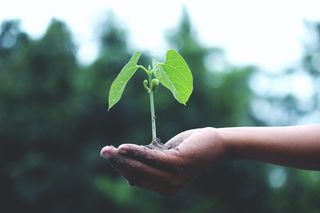Trauma
Post-Traumatic Growth During a Pandemic: Is That a Thing?
Can you grow your resilience while we face COVID-19? Should you try?
Posted May 10, 2020 Reviewed by Jessica Schrader

We are living in the midst of the worst pandemic in modern history. COVID-19 has infected more than 4 million people and caused almost 300,000 deaths worldwide. In the U.S. alone, we are close to 80,000 cases. As a result of its life-threatening potential, high levels of contagiousness, and spread throughout the world, this novel coronavirus has severely disrupted life as we know it. As journalist Ed Young writes in The Atlantic about COVID-19:
"It has crashed economies and broken health care systems, filled hospitals and emptied public spaces. It has separated people from their workplaces and their friends. It has disrupted modern society on a scale that most living people have never witnessed."
COVID-19 is a threat to our mental health
The mental health effects of the pandemic are yet to be fully determined. The lack of personal protective equipment for health care workers and other essential workers, the fact that COVID-19 disproportionally attacks the elderly, minorities, and other vulnerable groups, as well as the big pre-existing economic gap between rich and poor exacerbates its damaging psychological effects. Journalist Mike Levine, writing for ABC News, reported that:
"Last month the 'Disaster Distress Helpline' at the Substance Abuse and Mental Health Services Administration (SAMHSA) saw an 891% increase in call volume compared with March 2019, according to a spokesman for the agency."
What is post-traumatic growth?
Psychological theories have long suggested that while prolonged traumas can cause untold psychological damage, there is a portion of people who report psychological growth in the face of trauma.
Tedeschi and Calhoun (2004) define post-traumatic growth as “positive psychological change experienced as a result of the struggle with highly challenging life circumstances” (p. 1).
Post-traumatic growth has five facets that survivors report experiencing:
- a greater appreciation for life,
- closer social relationships,
- enhanced feelings of personal strength,
- spiritual growth, and
- the recognition of new possibilities for their lives.
The development of post-traumatic growth is theorized to lead to a sense of wisdom about the world, and, potentially, over time to greater satisfaction with life. Post-traumatic growth is seen as not only an outcome, but also as the process of coming to terms with trauma and changing your life in a more meaningful or positive direction. Tedeschi and Calhoun argue that post-traumatic growth is likely to occur later on in the process of adjusting to trauma, and it may or may or may not provide a sense of comfort or relief in the short-term. It can also co-exist with negative consequences of trauma, such as the strain placed on the mind and body by prolonged stress.
In the U.S., we are still in the initial stages of dealing with COVID-19 and so there may not be all that much opportunity for growth yet. When the crisis is over and we finally feel safe enough to process what has happened, post-traumatic growth is more likely. If the economy recovers and people are able to get jobs, they may feel stronger because of mental shifts they made or social support they received that helped them endure. When you don’t have a job and don’t know how to put food on the table, or when you have to risk your life every day in a production line, growth may be the furthest thing from your mind and that is OK.
How to promote post-traumatic growth and resilience in your own life
For those of us who are not in the front lines, or who feel they are out of the most acute danger, it may be useful to think about how we can consciously promote post-traumatic growth in our lives. Below are some strategies for each of the five facets: a greater appreciation for life, closer social relationships, enhanced feelings of personal strength, spiritual growth, and the recognition of new life possibilities.
Greater appreciation for life
Realizing that your life and health are not guaranteed can help you appreciate each day a little bit more. Thinking about people who are worse off than you may help you feel gratitude for being able to work from home, for having a job, or for receiving a loan from the government. Reflect on the support of your colleagues, or of your family and friends, or the resources you find on social media or on podcasts or YouTube. Think about the leadership and hard work of your state’s governor and the protection that has provided you, about the wise guidance of health officials, or the courage of journalists who tell you the truth.
Closer social relationships
This facet of post-traumatic growth may be more challenging because of social distancing guidelines or stay at home orders. Nevertheless, you may begin to feel closer to neighbors, friends, or family who regularly check up on you or whom you are able to help. Working from home may give you a bit more time to talk to friends and family members via the phone or internet. You may spend more time playing and eating with your kids or talking to your teenager.
More personal strength
When you face a difficult challenge that you eventually manage to master or even just survive, you may feel psychologically stronger as a result. Perhaps you didn’t think you could stay at home for so long or face the daily fear of getting infected if you are an essential worker. Doctors or nurses may not have realized their own inner strength to keep trying to save lives in the midst of chaos and crisis. Or you may get up each day and take care of your family despite feelings of depression or severe anxiety.
As Bob Marley said, "You never know how strong you are until being strong is your only choice."
Spiritual growth
Stay-at-home orders present challenges to meeting with your spiritual or religious group in person, although Zoom can provide you with a piece of what you would normally get. If you are staying home, this could be a good opportunity to start a meditation practice, to do some spiritually oriented yoga, or to read books and listen to talks and podcasts that enhance your spiritual awareness. Perhaps you could take some time to reflect on the universe, on your sense of a higher power, or on the spiritual values that make your life meaningful. Acts of service like helping feed the hungry, making masks, getting groceries for your elderly neighbor, or helping your child can also deepen your spiritual wellbeing.
New possibilities
Facing a societal crisis like COVID-19 often facilitates a focus on what is most meaningful in our lives and what is less important. Reflecting on how you spend your time might help you realize that you are not making the most of life’s opportunities. You may decide you want to live a healthier lifestyle or be more present with your children. If you are struggling to survive, this may make thinking of new possibilities more challenging and so it may be something that you put off for when things are more stable.
“Although life is full of the experience of suffering, it is also full of the overcoming of it.” —Helen Keller




